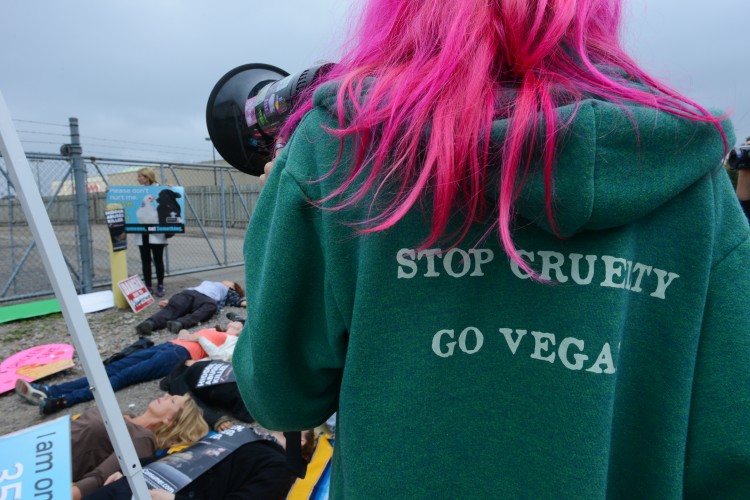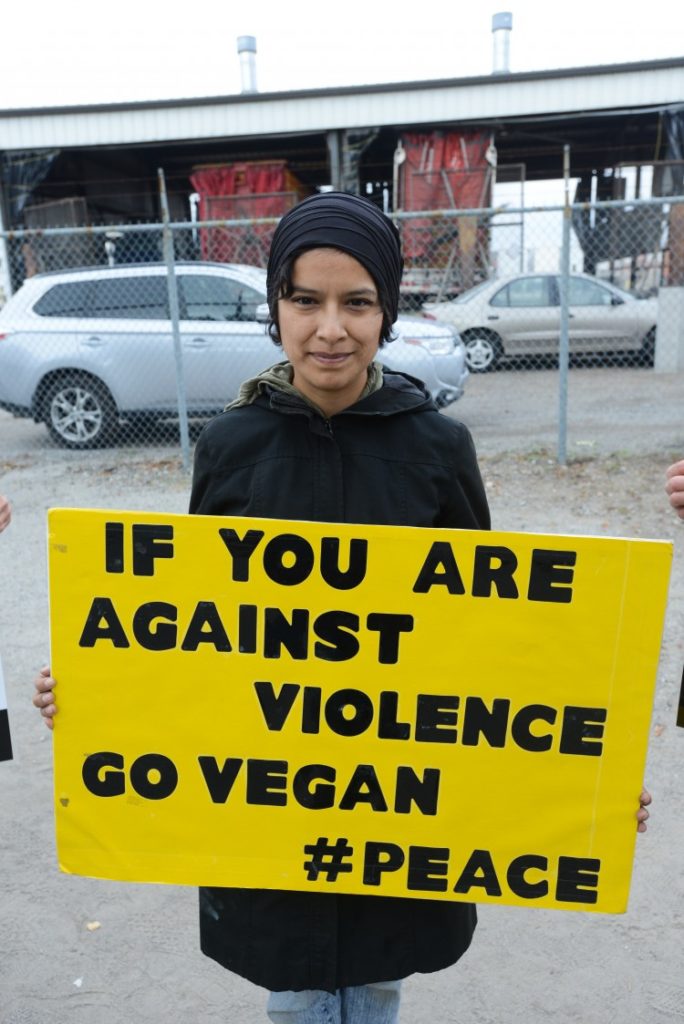In this talk given by Anoushavan Sarukhanya at the International Animal Rights Conference 2014, it is proposed that asking people to go vegan is not a strong claim that will move us closer to animal liberation. He shares some statistics — these show that almost all exploitation of nonhuman animals is exploitation for “food” (over 99%). Anoushavan suggests the focus of the vegan/animal liberation movement should be on the animals-as-food industry. He looks into the problems with the vegan conversion approach and encourages us to make a stronger claim, one which creates a public debate that leads to abolition.
Here’s my summary of the talk (with some paraprasing and small additions).
Making a claim
Social movements are “claim making machines.” They make a claim, then make that claim visible in society. The more visible this claim becomes, the more the issue becomes a “public problem.” This problem is debated in the public sphere until political action is taken. All social movements begin with a small minority of people, who begin making claims. Although we might think a minority can’t bring about change, it is when the unanimity of a practice is broken that it becomes easier for other people to also begin making the claim, so the movement and the call for change grows. Let’s apply this to the vegan/animal liberation movement:
Almost everyone eats nonhuman animals (and/or their secrections). However, a small minority of people believe this is wrong and make a claim that challenges this practice. This creates a fracture in the normality of eating nonhuman animals, which then leads to a debate on the practice.
To summarize the claim making process:
- Make the claim
- Public debate
- The issue becomes a political problem for society, due to the public debate around the issue
- Action is taken to address the issue (by politicians, governments, etc.)
Why do most people eat nonhuman animals?
Have you ever heard the saying “Most people eat meat because most people eat meat”? Most people conform to the norms of society. Anoushavan refers to the conformity experiments of Solomon Asch. These prove that most people go along with the majority, even if they think that the majority might be wrong. Put ten people in a room. Nine of them are actors. One of them is the test subject. The nine actors all choose the wrong answer. The test subject, more often than not, also chooses the wrong answer, even if they know it’s wrong. Why? Because people conform to the majority view. This is because they either think the group has more information about the situation than they do, or because they don’t want to be the outsider.

What claim does the vegan/animal liberation movement make? Generally, it is “go vegan,” or some variation on that theme. The aim of the movement is to convert people to veganism. The thinking underpinning the conversion approach is that because vegans are a minority, we need to create more vegans. Once we have more/enough vegans, we can make a bigger ask, such as close all slaughterhouses now, for example. Veganism is, in practice, a boycott. Other social movements have used boycotts as a tactic. During the struggle for Indian independence, there was a boycott of British textiles. However, the claim was: we want an independent India. The boycott was just one tactic that was used. The problem with veganism is that it is both a boycott and the claim.
Abolition is a stronger approach than “go vegan“
Anoushavan suggests that a call for abolition is a better move than the vegan conversion approach. People always prefer the course of action that completely eradicates the problem, instead of treating the symptoms of a problem.
The Proportion Dominance Effect provides evidence for this. An example of this given by Anoushavan is:
Two industries are polluting a river. Two solutions are offered:
- Stop Industry A and save 245 fishes out of 350.
- Stop Industry B, and save 251 out of 980 fishes.
The preferred solution, for most people, was option 1, to stop Industry A. Ultimately, fewer fish lives are saved, but the problem seems to be effectively resolved. This is the preferred option even though choosing the second option would save six more lives. Now, think of numbers when you ask people to go vegan. Do you tell people how many billions of nonhuman animals are killed each year? Do you expect that telling them these numbers will shock them into taking action (the action = go vegan)?
We tell people if they stop eating nonhuman animals, they will be helping to solve the problem. Except, the Proportion Dominance Effect shows that they will be less likely to think their actions will have an impact. They know there will still be billions of animals killed each year, even if they personally “save” 100 animal lives a year by going vegan. Anoushavan says we need to reframe our claim. A more persuasive claim would be to tell people that veganism is a global boycott, with the aim of abolishing nonhuman animal exploitation. People would not then think of veganism as just their own personal choice, but as a boycott with the goal of abolition and a political project.
Vegan conversion is not efficient

The vegan conversion approach comes across as a matter of personal choice, not justice for nonhuman animals. It doesn’t create the right debate in society. When our ask is “go vegan,” we end up talking about consumption: our dietary/lifestyle preferences, the practicalities of going vegan, and vegan purity (how vegan are you? what type of vegan are you?). Vegan conversion is also incredibly slow. Other social movements didn’t use the conversion approach, but it is an approach that religions use. Christians have been converting people to Christianity for thousands of years, but not everyone in the world is Christian yet. How many thousands of years do we need to wait before the world goes vegan? Anoushavan concludes from this that the conversion approach is inefficient.
How do we make our claim for abolition then? Anoushavan makes some suggestions. When asked why we don’t eat nonhuman animals, we should say: “I am for the abolition of animal exploitation” or “I am boycotting animal exploitation.” These statements express that we are asking for a change in society, not just a making a personal choice. During the campaign to abolish the Transatlantic Slave Trade, the majority of abolitionists did not focus on their own purity. Some did boycott the products of slavery, but even then, their claim was still: abolish the slave trade. Their claim was not: be like me and boycott the products of slavery.
Anoushavan also believes that when we speak about health and environment in relation to veganism, we take the focus off speciesism. In the public mind, this reduces the impact of the ethical case for justice for nonhuman animals.
Vegan claim-making is morally unacceptable
Anoushavan considers the vegan conversion approach to be morally unacceptable. Repeat: the claim of the vegan/animal liberation movement is not morally acceptable. Anoushavan gives some examples of vegan claim-making: “Go vegan”; “Veganism is good for the planet”; and “Going vegan is good for your health.” These claims are failing the victims. Anoushavan uses the example of human concentration camps. If we said, “Boycott the products of the concentration camps,” that would not be morally acceptable. We should be calling for the abolition of those concentration camps.
Anoushavan suggests the stronger claims, which people will respond to more seriously, as they highlight injustice, could be: “Close slaughterhouses now”; “Abolish the property status of animals”; and “Society must fight and condemn speciesism just as it fights racism and sexism.” In conclusion, Anoushava says we have to be sure that our message is understood as a demand for a change in our society.
Response to the talk
I agree with much of what Anoushavan has said in this talk. I do think the “go vegan” claim is not very powerful or effective. We need a strong, clear anti-speciesist abolition message. I will do a follow up post to this one, with a more detailed response to Anoushavan’s position. There are some parts of his argument I think the movement must take on board, but some parts need to be tweaked or investigated further.
Featured image: “go vegan” graffiti in Spain. Image credit awkwardcatsunite, CC BY-SA 2.0.





